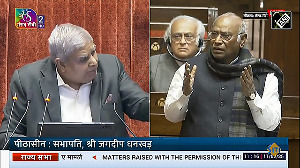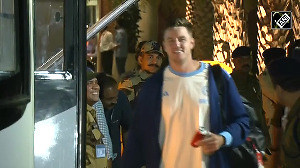No middlemen or front men and no unknown visitors to be allowed. Instructions to the personal secretaries are clear and unambiguous as Members of Parliament appear to become cautious now to ward off any unwanted visitor in the disguise, thanks to the cash-for-query string operation.
As both houses of Parliament expelled the members caught on camera by television channels, shocked Members of Parliament issued strict instructions to their secretaries on do's and don'ts. "I have told my staff not to allow unknown visitors- just tell them sahib nahin hain," a Rajya Sabha member said. Stories doing rounds of the North and South avenue where most of the first-timers and back-benchers live said that over 70 MPs were accosted by the scribes on the sting mission.
Eleven of these fell to the trap. It is an open secret that most of the MPs leave blank signed letters, railway reservation slips with their secretaries. Requests come from all and sundry for recommendations to ministries, to getting a railway reservation. The MPs simply cannot afford to entertain such requests personally nor can he annoy the members of the constituency. The job thus is left to the trusted personal secretary who knows who is to be entertained.
With the "sting" having caused enough damage, these signed letters and reservation slips are being quietly withdrawn, a personal secretary to an MP said.
"No instructions for me," said PS to another Member of Parliament. "I have been in this field for over 40 years and know how to filter the visitors,: he said adding that the inexperienced MPs who threw caution and morality to the wind landed themselves in trouble.
Complete Coverage: Cash for Questions Scam
There is sudden "silence", said a scribe. The MPs have kind of become introvert. The fallout, first of the sting operation and, the action against the members will be that no MP would now entertain visitors at home, he said. MPs' quarters in Lutyen's Delhi normally are quiet during the inter-session period but buzz with activities once parliament sessions begin.
"Netas" of various levels, voters with various jobs to be done descend on Delhi and, as a matter of right, camp at the MP's quarters. With the latest development one does't know who is carrying a hidden camera and with what intention, an MP said. On the MPLAD, another MP said that the fund of Rs 2 crore a year is in fact not enough even to repair a stretch of a road in a constituency.
Given the size of a Lok Sabha constituency there are demands from voters that vary from building roads to schools, water supply and so on. MPs now will have to be extra careful in issuing recommendatory letters to the district collectors for utilisation of funds from the MPLAD, he said. Hesitant to talk on record, the deputies, however, are shocked at the stringent punishment that is being meted out to their colleagues who were caught on the camera.
"None is defending those who sought money for raising queries in the house but their suspension from membership is like awarding death sentence to a petty thief," the MP said. The tainted MPs have already been punished - they can't show their faces their constituencies - nor can they face others in the capital. Their parties are unlikely to give them tickets in the next polls- the punishment meted out even before any examination is stringent enough, he said.
Banwarilal Purohit, a former MP, however, did not agree. "Those caught on the camera have breached the trust imposed in them by their over 20 lakh voters," Purohit said. What Parliament has done in expelling them was absolutely essential to send a message to others, he said.
It is a matter of shame that a member of Parliament is "for sale" for paltry sums of a couple of thousand rupees, he said. Purohit, however, said that those who fell in the trap were the small fish. "What about the sharks?" he asked saying that lobbies of MPs work regularly for their corporate connections.
Purohit felt that the media operation and subsequent expulsion of the guilty members of parliament would prove to be a deterrent. Although this would not weed out corruption, he said. Those people's representatives who are honest and transparent should have nothing to fear, he said.
Former Director General of Police Maharashtra A S Inamdar who was known for his drives against officials when he headed the state's anti-corruption department said this was the fastest action ever taken against corruption public servants- the real fast track.
He said hands of anti-corruption wings of the government machinery were tied because of procedures involved. A police constable caught while taking a bribe of Rs 200 in 1991 was awarded punishment by a court in 2005. He said delay in trial of corruption cases made a mockery of cases filed by the police.






 © 2025
© 2025